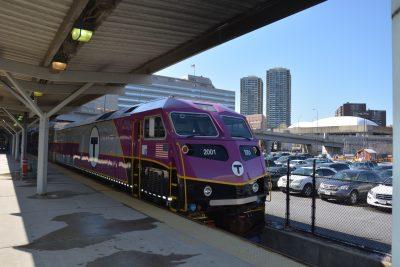
The MBTA’s Fiscal and Management Control Board unanimously voted to support major improvements on its commuter rail system Monday, passing resolutions calling for partial electrification of the system and increased service on the commuter rail’s busiest lines, with some stations to see a train every 15 to 20 minutes.
While the MBTA has yet to develop a comprehensive plan or timeline for these improvements, the project is expected to cost billions of dollars.
The move drew widespread approval from transportation advocacy nonprofits across the Greater Boston Area, who have long been calling for improvements to the commuter rail to increase accessibility and reliability while also taking steps to reduce greenhouse gas emissions.
Jarred Johnson, chief operating officer of Transit Matters, a non-profit organization advocacy group pushing for greater access to public transportation for all residents of the Greater Boston Area, said he was happy the MBTA decided to support electrifying the commuter rail as one of the best ways to improve rail service.
“Transit Matters is excited about the fact that they have embraced electric trains,” Johnson said. “Electric, self-powered trains are not only better for the environment, but they’re also … going to enable the kind of service frequency that we need.”
Stacy Thompson, executive director of transportation advocacy group Livable Streets Alliance, said increasing the frequency of train service would significantly increase commuter rail ridership.
“If we ran service more frequently and if the service were more reliable, more people in those communities would choose to use the commuter rail system,” Thompson said. “The goal is to get more people riding transit.”
Before Monday’s meeting, MBTA officials had spent a year developing a “Rail Vision” study that outlined six different options, called “alternatives,” to improve commuter rail service throughout the Commonwealth. Throughout the meeting, board members were especially interested in alternatives five and six.
Alternative five pushed for an electrified urban rail, which services the busier, inner regions of the commuter rail network and was estimated to cost $10.6 billion, while alternative six institute a full transformation of the commuter rail.
This full transformation would have cost an estimated $28.9 billion and called for the construction of an additional 60 miles of track, electrification of the rail system and increased frequency until every station would see a train every 15 minutes.
Johnson said while his organization originally advocated for alternative six, the FMCB ultimately did not choose one single option, settling for an “option 5.5.”
“What they ended up endorsing yesterday was sort of a midpoint,” Johnson said. “They took some of the best elements of alternative five and alternative six.”
Monica Tibbits-Nutt, vice president of FMCB, said during the meeting she was concerned Massachusetts was not yet ready to pursue the massive changes outlined in alternative six, but said there were many other ways the MBTA could improve it commuter rail system.
“There are a significant number of policy decisions that we need to be taking in consideration of all of these alternatives,” Tibbits-Nutt said. “I’m kind of in a 5.5 because I do want to see near-term pilots but I do have a lot of concerns with going into the full transformation if we can’t answer a lot of these questions.”
Jacob Auchincloss, a Newton city councilor and vice chair of Newton’s Transportation and Public Safety Committee, also advocated for alternative six and said during the meeting that city governments and residents were willing to move away from car based transportation if commuter rail service is improved.
“But to do that we need to have confidence that the state is committed to reliable regional rail service that a resident can truly build her life around,” Auchincloss said.
Of the railway improvements discussed, time and money were of greatest concern to the residents of the Greater Boston area.
Kathy Paul, vice president of Massachusetts Senior Action Council, a non-profit that advocates for issues affecting the state’s senior citizens, said during the meeting she is disappointed in the state’s lack of investment in transportation in previous years.
“Senior Action Council is back to support a plan to expand the commuter rail service to 15 minute trains and lowering the fare so working people and seniors and handicap can access and afford the much-needed public transportation,” Paul said.
Geira Williams, 53, of Stoneham, rides the T and commuter rail often and said the train system needs to be improved to attend to the time and affordability of riders.
“Where I live, [the train comes] every hour and a half, and not on Sunday,” said Williams. “It’s very expensive, because some jobs don’t pay enough and we pay more for transportation than we make.”
Suzanne Richards, 54, of Mattapan said the train service needs to be improved to reduce malfunctions and keeping the riders informed of delays.
“Notifications of service interruptions is not timely enough so that people can make alternate arrangements,” Richards said. “Really, it’s terrible for the amount of money we pay and that’s just talking about the MBTA.”






















































































































